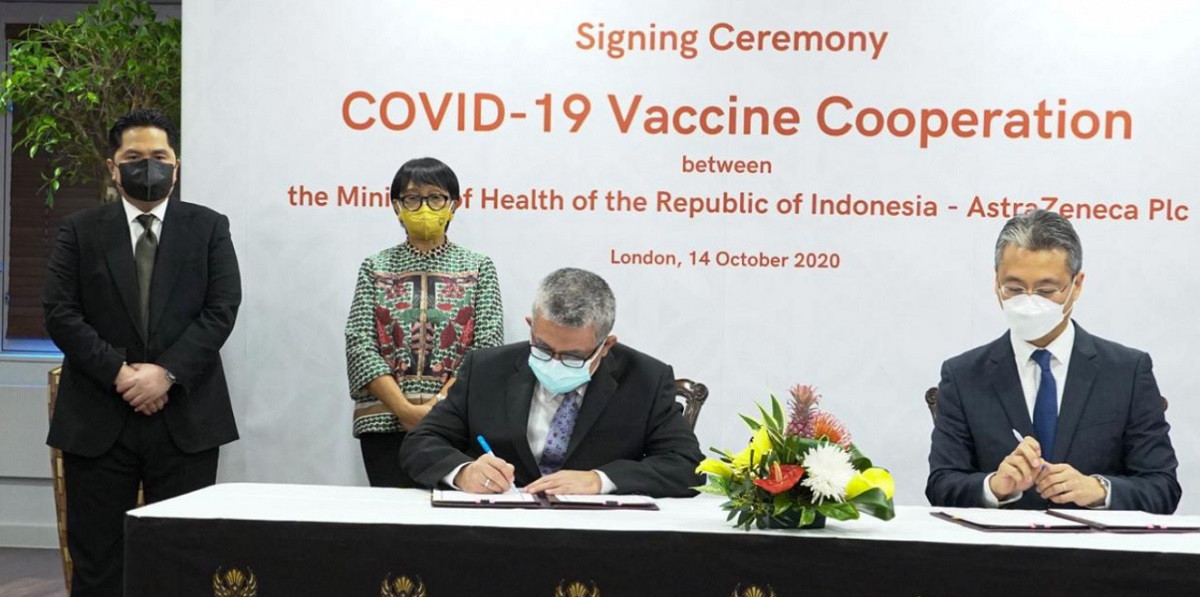Popular Reads
Top Results
Can't find what you're looking for?
View all search resultsPopular Reads
Top Results
Can't find what you're looking for?
View all search resultsVaccines offer hope, we cannot afford to leave the poor behind
While vaccination drives are well underway in the developed world and many middle-income countries, the poorest countries lag behind and several are yet to start.
Change text size
Gift Premium Articles
to Anyone
 Vaccine deal: State-Owned Enterprises Minister Erick Thohir (left) and Foreign Minister Retno Marsudi (second left) witness the signing of a letter of intent between representatives of the Indonesian Health Ministry and AstraZeneca in London on Oct. 14, 2020. Indonesia ordered 100 million doses of COVID-19 vaccine from the British pharma giant. (Courtesy of/Indonesian Foreign Ministry)
Vaccine deal: State-Owned Enterprises Minister Erick Thohir (left) and Foreign Minister Retno Marsudi (second left) witness the signing of a letter of intent between representatives of the Indonesian Health Ministry and AstraZeneca in London on Oct. 14, 2020. Indonesia ordered 100 million doses of COVID-19 vaccine from the British pharma giant. (Courtesy of/Indonesian Foreign Ministry)
T
he arrival of safe and effective COVID-19 vaccines offers light at the end of the tunnel for people across the world after an extremely challenging year. It also offers hope of a sustained economic recovery, for governments and companies whose finances have been put under unprecedented stress, and for people who have seen their livelihoods disappear before their eyes.
However, uneven distribution and rollout of vaccines has laid bare the gulf between developed and developing countries. This gap threatens to delay the end of the pandemic, costing more lives and exacerbating economic damage.
While vaccination drives are well underway in the developed world and many middle-income countries, the poorest countries lag behind and several are yet to start. The moral imperative to ensure that everyone has access to vaccines, including the world’s poorest who suffer disproportionately from the pandemic, is clear.
It is also a matter of self-interest for those countries who can provide vaccines for their own citizens. The emergence of new variants of COVID-19 threatens to undermine vaccination efforts worldwide.
A study by the ICC Research Foundation has found that the global economy stands to lose up to US$9.2 trillion in the absence of equitable and global vaccine access and distribution. The economic rationale for investing to expand access to vaccines – alongside COVID-19 tests and treatments – should be evident. The ongoing vaccination efforts require close multilateral cooperation and coordinated action to succeed.
There is an agreed upon mechanism to ensure global, equitable access to vaccines. It is called the Access to COVID-19 Tools Accelerator (ACT-A). Launched in April 2020, it has built the world’s largest portfolio of vaccines, tests and treatments needed to tackle the pandemic, alongside an advanced purchasing system to get them to the places they are needed. The challenge now is to ensure that ACT-A and COVAX, ACT-A’s vaccine pillar, receives the funding it needs.
Norway and Indonesia stand together as ardent advocates for ACT-A and global solidarity; Indonesia co-chairs the COVAX Engagement Group, the vaccine pillar of ACT-A, while Norway co-chairs the ACT-A Facilitation Council. Both are aimed at closing the funding gap as soon as possible. The need for urgent action is clear.
The ACT-A initiative requires us to go beyond traditional aid budgets. Norway has allocated substantial resources to promoting global health and combating the pandemic: More than $500 million has been invested in ACT-A, and approximately $150 million to support COVAX to make vaccine available to low- and middle income countries.
This Monday, Indonesia received its first doses of AstraZeneca through the COVAX-facility and is set to receive tens of millions of doses over the course of 2021. Countries like Ivory Coast and Ghana have also received their first doses, demonstrating that COVAX is more than just big words. It works.
Norway is committed to continuing our funding and we call on everyone to join us. Together we can end the pandemic!
***
The writer is Norwegian ambassador to Indonesia and Timor-Leste.









